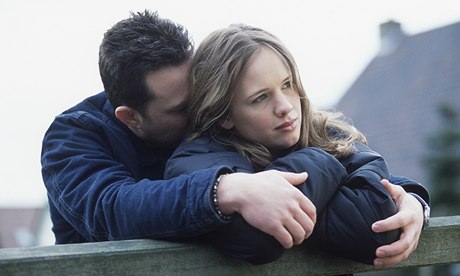
"It seems trivial almost when your life is on the line to ask the oncologist about having sex. You think, 'Thank God I'm here and I'm alive.' And, does it really matter if I can't have sex again? Because the bigger picture is, well, you kept me alive.
"But on the other hand, my husband and I have been through a lot and pain-free sex would be nice."
Angela Walker, 57, has been living with ovarian cancer and its after effects for a decade. When she was undergoing chemotherapy in 2003, sex was difficult and even now, five years clear of the disease, she remains tender.
She is not alone. A survey by Macmillan found that 72% of cancer patients said their sex lives had suffered after diagnosis. Some cancer surgeries may affect erectile function or the condition of the vagina and various cancer treatments – chemotherapy, hormone therapy, radiotherapy – can disrupt the hormonal balance leading to a loss of libido. Some treatments may cause early menopause in women, which can mean the vaginal wall becomes dryer and thinner resulting in painful sex.
Dr Sarah Blagden, an ovarian cancer specialist at the Garry Weston cancer centre at Hammersmith hospital in London, is aware of the problem. But, she only discovered that her patients may be having trouble resuming their sex lives after treatment a few years ago when she brought the issue up with one woman who broke down in tears.
From then on, Blagden made a point of asking her patients about their sex lives and was surprised by how many said they were having problems.
"A lot of patients feel that bringing up their sex lives is too trivial just after the oncologist has saved their lives. But doctors are increasingly realising, as more people survive cancer, that they have to rehabilitate patients as well. They have to help them put the whole cancer experience behind them and resuming their sex lives is part of that."
Walker agrees that sex doesn't often get discussed. "I know other women who have cancer who don't have sex because they've tried and it's really painful. I think it's important that women hear this and know that it's not just them ... We all think we talk about sex, but we don't really."
In a survey, Blagden conducted of just under 100 ovarian cancer patients, vaginal dryness was the predominant sympton, affecting 87% of those who were sexually active. Lack of desire was a factor for 43% of the respondents and fatigue was a preventative factor for 30%.
There are treatments that can help, however. And, in Blagden's experience of working with people with ovarian cancer, she has found that almost all of her patients managed to overcome the effects on their sex lives by making small adjustments.
Blagden says: "For many women, sorting out vaginal dryness will be the key to improving their sex life ... It is worth trying over-the-counter vaginal moisturisers like Replens or Sensilube in addition to lubrication. Topical oestrogen creams can also be useful."
Both Blagden and Walker want more doctors to raise the issue. Warning patients that their vaginal walls might be a bit dry and that there are vaginal moisturisers on the market can stave off upset and embarrassment.
For men, meanwhile, erectile problems may be tackled by taking Viagra, having injections or using a suction pump to gain and maintain an erection.
Depression and feelings of inadequacy are also common among both sexes after cancer.
Blagden refers her patients to a psychosexual counsellor if that seems appropriate. "Fear of pain can lead to loss of desire," she says. Psychosexual counselling can help to "reverse the fear".
Catherine Hood, a doctor and a psychosexual counsellor at the Raymede Clinic and the LOC oncology centre, London, says: "Cancer affects people's consciousness and how they feel about themselves. It knocks their confidence and affects how they share themselves with their partner ... Sex is an emotional act: people have to feel right, some people find it very difficult to let go, people who have been diagnosed with cancer often batten down their emotions to get through it and they have trouble trusting themselves, they don't trust their body. It has let them down."
Hood says these fears can be assuaged by providing information and reassurance. Timing is key to treating depression and psychosexual issues – catching the problem early and counselling patients before it becomes overwhelming or entrenched is important.
Walker realises the importance of tackling the problem early. She says: "It's a bit lonely having cancer, especially afterwards. When you are being treated you've got all those dates on your calendar, but afterwards you are floundering a bit because you are not quite sure what you are supposed to do. Side-effects like problems with sex fall by the wayside because the hospital staff focus on treating the cancer itself."

